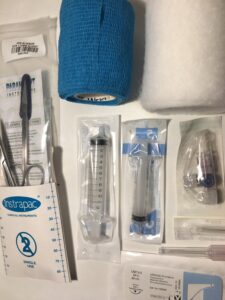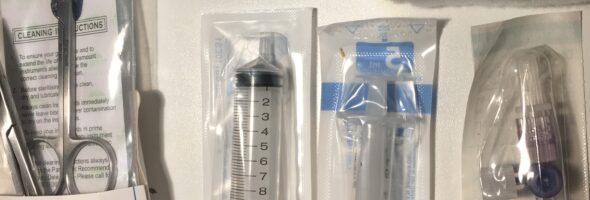Hello again! I am Jessica a 3rd year vet student and I thought I would take you through what my year has been like so far, since this year has not only seen the transition from pre-clinical to clinical teaching, but we have also had to get used to the hybrid teaching format.
The transition to 3rd year…
This year is the start of clinical teaching compared with the previous 2 pre-clinical years. We have already covered so much with both pathology and also a clinical foundation course which includes oncology, anaesthesia, pharmacology and surgery. It is really interesting now being able to build on our existing knowledge and relevantly apply it to clinical examples and conditions. There does seem to be a lot of different drugs and disease processes to learn which can feel a bit overwhelming, but it really helps when you understand the pathogenesis, find particular patterns and come up with mnemonics to remember certain names. Also, when you start to recognise lesions in specimens, or know which drug to administer under certain conditions, it really makes you feel like a proper vet.
Transitioning to hybrid teaching…

 While I initially found the transition to online teaching slightly challenging – since recorded lectures seem less engaging compared to live ones and you are not moving between classes, so there seems to be fewer ways to break up your day – I now feel more settled with the way of working and am actually enjoying it more than I thought! There are more interactive sessions than I anticipated with the opportunity to engage via discussion boards, writing answers live on screen and writing comments in the chat box during a lecture or seminar. The online layout also allows you to be more flexible with your day – studying more when you feel more productive and then taking breaks when you want, such as going for a walk when the sun is shining.
While I initially found the transition to online teaching slightly challenging – since recorded lectures seem less engaging compared to live ones and you are not moving between classes, so there seems to be fewer ways to break up your day – I now feel more settled with the way of working and am actually enjoying it more than I thought! There are more interactive sessions than I anticipated with the opportunity to engage via discussion boards, writing answers live on screen and writing comments in the chat box during a lecture or seminar. The online layout also allows you to be more flexible with your day – studying more when you feel more productive and then taking breaks when you want, such as going for a walk when the sun is shining.
The practicals we have have been cut down a lot to facilitate only going onto campus once per week. However, we now have new online material to aid our learning such as post mortem images, online histology slide boxes (that you can navigate across and zoom into much like a real microscope) and my favourite of all is a suture kit that we have at home to practice what we have learnt in class. We have already learnt quite a few clinical skills such as bandaging techniques and hand ties for surgery so practicing these in the comfort of your home makes you feel quite vet-like!
Additional activities and talks…
COVID-19 has definitely not stopped the number of additional talks hosted by various speakers in relation to the many societies at the vet school and wider university. Some of my favourites I have listened to so far were on cow reproduction, which put a lot of emphasis on understanding the hormones regulating the oestrus cycle and the way drugs can intervene, and a bat rehabilitation talk that provided guidance on how to deal with bats in the clinic if one is brought in by a member of the public: how matting of fur commonly hides tiny puncture wounds from cat attacks and for brown long eared bats their ears should only be up when flying or when sick/dying. They are such unusual and interesting animals and we learnt plenty of interesting facts : bats can live up to 41 years and a baby bat at birth can weigh as much as 1/3 of the mother’s weight.
This year we are allowed to start our Clinical EMS placements; however, with it being difficult to attend practices face-to-face, I have instead undertaken some online courses, such as one about the role of a wildlife vet working with Rhinos in South Africa run by the Expedition Project. It is great that despite not being able to physically go abroad and learn about these amazing animals we are at least able to hear from experienced vets in the field to further inspire us to learn more, especially when it comes to planning ahead for our future careers.



